|
Books Should Be Free Loyal Books Free Public Domain Audiobooks & eBook Downloads |
|
|
Books Should Be Free Loyal Books Free Public Domain Audiobooks & eBook Downloads |
|
Books of Memoirs |
|---|
|
Book type:
Sort by:
View by:
|
By: Edward Streeter (1891-1976) | |
|---|---|
 Dere Mable
Dere Mable
Bill is in training camp, preparing to go off to World War I. This book is a collection of love letters written to his sweetheart, Mable. The letters are humorous, mis-spelled, and have many stories of life in an army camp – all from Bill’s unique perspective. | |
By: Robert Falcon Scott (1868-1912) | |
|---|---|
 The Journals of Robert Falcon Scott
The Journals of Robert Falcon Scott
Capt. Robert F. Scott's bid to be the leader of the first expedition to reach the South Pole is one of the most famous journeys of all time. What started as a scientific expedition turned out to be an unwilling race against a team lead by R. Admunsen to reach the Pole. The Norwegian flag already stood at the end of the trail when Scott's party reached their target. All the five men of the Scott expedition who took part in the last march to the Pole perished on their way back to safety. Robert F. Scott kept a journal throughout the journey, all the way to the tragic end, documenting all aspects of the expedition... | |
By: Ward Muir (1878-1927) | |
|---|---|
 Observations of an Orderly
Observations of an Orderly
Ward Muir brings us into the heart of an English war hospital, describing scenes of cleanliness, triumph, order and sadness. Through the eyes of the orderly we get to see the processes that kept the wards running, and relive some tales from within the hospital walls. | |
By: Thomas Frost (1821-1908) | |
|---|---|
 In Kent with Charles Dickens
In Kent with Charles Dickens
By his own admission, Thomas Frost found it hard to make a living from his writing, and no doubt he used the name of Dickens in the title of this book to boost sales. Frost tells a good tale, and the book is not only of interest to enthusiasts of Dickens and the county of Kent.He includes some of Dickens’ own descriptions of locations, as well as regaling us with anecdotes about towns and villages which he visits, including an account of the last armed rising on British soil – the Battle of Bossenden Wood... | |
By: Samuel Pepys (1633-1703) | |
|---|---|
 Diary of Samuel Pepys
Diary of Samuel Pepys
| |
By: Arthur Graeme West (1891-1917) | |
|---|---|
 The Diary of a Dead Officer
The Diary of a Dead Officer
Published posthumously in 1919, this collection of diary entries presents a scathing picture of army life and is said to be one of the most vivid accounts of daily life in the trenches. It chronicles West's increasing disillusion with war and his move toward pacifist and atheist beliefs. The final part consists of his powerful war poems, including God, How I Hate You, You Young Cheerful Men, and Night Patrol. West was killed by a sniper in 1917. In view of some of his poems, one wonders if death was not unwelcome. (Introduction adapted from Wikipedia by Ruth Golding) | |
By: Lavinia Honeyman Porter | |
|---|---|
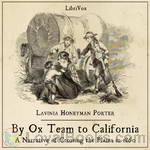 By Ox Team to California - A Narrative of Crossing the Plains in 1860
By Ox Team to California - A Narrative of Crossing the Plains in 1860
Imagine a young, twenty-something woman in 1860, reared “in the indolent life of the ordinary Southern girl” (which means she has never learned to cook); married to a professional man who knows “nothing of manual labor;” who is mother to a young son; and who has just found out she is pregnant with their second child. Imagine that this couple has become “embarrassed financially” by “imprudent speculations,” and that they are discussing what to do. They decide to buy a wagon and three yoke of unbroke oxen and head overland to California... | |
By: Henry Vizetelly | |
|---|---|
 California
California
Vizetelly, writing under the pseudonym J. Tyrwhitt Brooks, recalls an expedition to California he took between 1847-1848 . Originally, he planned to enlist as a surgeon for the US Army during the Mexican war, but conflicts had ended by the time he applied. In a quick change of plans, he joined a group of prospectors on their way to the newly found gold fields of California. While he might not find service in the military, his training as a physician made him a valuable addition to the ragtag team of explorers... | |
By: Watkin Tench (1758-1833) | |
|---|---|
 A Narrative of the Expedition to Botany-Bay
A Narrative of the Expedition to Botany-Bay
Watkin Tench was an officer of the British Marines in the First Fleet to settle NSW. This is an interesting and entertaining account of his experiences during that time (Introduction by Tabithat) | |
By: Alvar Núñez Cabeza de Vaca (ca. 1490/1507 - ca.1557/1579) | |
|---|---|
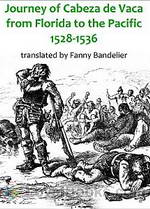 The Journey of Alvar Núñez Cabeza de Vaca
The Journey of Alvar Núñez Cabeza de Vaca
Few stories of shipwreck and survival can equal that of the 16th century Spaniard Alvar Núñez Cabeza de Vaca who, cast ashore near present day (USA) Tampa Bay, Florida, in 1528, survived eight years of hand-to-mouth existence among the Indians of the South and Southwest, and who walked on foot across the plains to the Pacific Coast, arriving in Mexico in 1536. In 1542 he published an account of his adventures, and the present reading is based on Fanny Bandelier’s English translation of that text... | |
By: Eddie Rickenbacker (1890-1973) | |
|---|---|
 Fighting the Flying Circus
Fighting the Flying Circus
This is the WWI memoirs of Medal of Honor winner, Capt Eddie Rickenbacker. He fought in and eventually became commander of the 94th "Hat-in-the-Ring" Squadron, which ended the war with the highest number of air victories of any American squadron. The circus mentioned in the title refers to the German squadron commanded by the famous Red Baron, Manfred von Richthofen. (Introduction by Brett W. Downey) | |
By: Anna Green Winslow (1759-1779) | |
|---|---|
 Diary of Anna Green Winslow A Boston School Girl of 1771
Diary of Anna Green Winslow A Boston School Girl of 1771
| |
By: George-Günther Freiherr von Forstner (1882-1940) | |
|---|---|
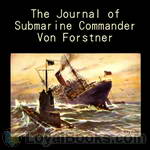 The Journal of Submarine Commander Von Forstner
The Journal of Submarine Commander Von Forstner
The Journal of Submarine Commander Von Forstner is a graphic account of WWI submarine warfare. Forstner was the commander of German U-boat U-28. His journal, first published 1916, gives a gritty picture of daily life inside a submarine and details several torpedo attacks on Allied shipping. The 1917 translation of Forstner’s journal into English was unquestionably intended to bolster the Allied war effort. In the foreword, the translator states: “Nothing at the present day has aroused such fear as this invisible enemy, nor has anything outraged the civilized world like the tragedies caused by the German submarines... | |
By: May Kellogg Sullivan | |
|---|---|
 A Woman Who Went to Alaska
A Woman Who Went to Alaska
Alaska has only been a state since 1959, and the breathtaking terrain remains mostly unspoiled and natural. In modern times, many of us have had the pleasure of visiting Alaska via a luxurious cruise ship, where we enjoyed gourmet meals, amazing entertainment, and a climate-controlled environment. It's easy to also book a land package that enables you to see more of the country by train.Imagine what it was like to visit the same wild, untamed countryside in 1899. Instead of boarding a sleek, stylish cruise ship, you travel for weeks on a steamer... | |
By: Harriet E. Wilson (1825-1900) | |
|---|---|
 Our Nig, or, Sketches from the Life of a Free Black, In A Two-Story White House
Our Nig, or, Sketches from the Life of a Free Black, In A Two-Story White House
Frado is a colored girl, living in the USA a few years before the Civil War. She is abandoned by her own white mother in the house of the Bellmont's- where she is treated badly. This is a sad book, but Frado's cheerfulness and dignity will make you love her until the end. (Introduction by Stav Nisser) | |
By: Sarah Morgan Dawson (1842-1909) | |
|---|---|
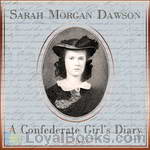 A Confederate Girl's Diary
A Confederate Girl's Diary
Sarah Morgan Dawson was a young woman of 20 living in Baton Rouge, Louisiana, when she began this diary. The American Civil War was raging. Though at first the conflict seemed far away, it would eventually be brought home to her in very personal terms. Her family's loyalties were divided. Sarah's father, though he disapproved of secession, declared for the South when Louisiana left the Union. Her eldest brother, who became the family patriarch when his father died in 1861, was for the Union, though he refused to take up arms against his fellow Southerners... | |
By: William Hanford Edwards | |
|---|---|
 Football Days: Memories of the Game and of the Men behind the Ball
Football Days: Memories of the Game and of the Men behind the Ball
A book reminiscent of the days when football was gaining popularity in America by MHAIJH85 | |
By: Dorothy Osborne (1627-1695) | |
|---|---|
 Love Letters of Dorothy Osborne
Love Letters of Dorothy Osborne
A lively, interesting and important collection of 17th century love-letters written by an English lady, against the background of the Civil War and the Restoration | |
By: Jacob William Wright | |
|---|---|
 The Long Ago
The Long Ago
Short memory of boyhood by a little-known American poet based in Carmel-By-The-Sea, California. | |
By: Anne MacLanahan Grenfell (1885-1938) | |
|---|---|
 Le Petit Nord
Le Petit Nord
A collection of letters from Anne (MacLanahan) Grenfell, future wife of Sir Wilfred Grenfell, regarding her year of missionary service at the orphanage in St. Anthony, Newfoundland and Labrador, Canada. | |
By: Frances Sheridan | |
|---|---|
 Memoirs of Miss Sidney Bidulph
Memoirs of Miss Sidney Bidulph
Sidney and Cecilia are best childhood friends who are forced to part for 5 years. In that interval, Sidney Bidulph - an undoubtedly good and dutiful woman - writes to her friend about everything: her marriage, her children, her other friendships and, above all, about her great love for Mr. Faulkland. In an amazing and unforgettable way, this book shows us that the road to happiness is not always clear - and that sometimes doing what seems to be right is not really the right thing to do. With Rachel's lovely reading, we see her - Sidney Bidulph - as she was meant to be, and as she really is. | |
By: Alfred Dreyfus (1859-1935) | |
|---|---|
 Five Years of My Life 1894-1899
Five Years of My Life 1894-1899
Alfred Dreyfus, a Jewish captain in the French Army was court martialed in 1894 on a trumped up charge of treason and condemned to life imprisonment on Devil’s island, a penal colony off French Guiana. His prison diary, published as Five Years of My Life in 1901 is a heroic tale of survival against daunting odds: isolation, deprivation, torture . . Alfred left behind in Paris his wife Lucie, who, forbidden to join her husband in exile, struggled to protect their two children from the rampant anti-Semitism that swirled about them, while she begged her husband to hold onto life as she tried to clear his name... | |
By: Philip Stanhope, 4th Earl of Chesterfield | |
|---|---|
 Letters to His Son on the Art of Becoming a Man of the World and a Gentleman
Letters to His Son on the Art of Becoming a Man of the World and a Gentleman
Philip Stanhope, Earl of Chesterfield, was at one time Ambassador to the Hague, negotiated the second Treaty of Vienna, was a founding governor of London’s Foundling Hospital, Lord-Lieutenant of Ireland, and Secretary of State. Having no legitimate children, his heir was his third cousin (another Philip) whom he adopted. Although known as a hard, calculating man, he is most well known for his letters to his natural son (i.e., illegitimate son) (also called Philip). When Philip died in 1768, the letters are addressed to his grandchildren (Philip’s two sons, Charles, and, yes, Philip!)... | |
By: Fa'iz El-Ghusein (1883-1968) | |
|---|---|
 Martyred Armenia
Martyred Armenia
This is a first hand account of the Armenian Genocide written by a Syrian who had been a Turkish official for three and a half years. His accounts tell of the worst of humanity, and also of the noblest. The noble include families who courageously support each other in the face of death, and Turks who refuse to follow orders to kill, knowing that they shall be executed themselves for their defiance. | |
By: Gen. George A. Custer (1839-1876) | |
|---|---|
 My Life on the Plains
My Life on the Plains
George Armstrong Custer (December 5, 1839 – June 25, 1876), one of the most mythologized figures in American history, was an United States Army officer and cavalry commander in the American Civil War and the Indian Wars. He eventually met his fate in the battle of Little Big Horn in one of the most notable defeats of American armed forces.My Life on the Plains is an autobiographical first-hand account of the Indian Wars of 1867-1869, detailing the winter campaign of 1868 in which Custer led the 7th US cavalry against the Cheyenne Indians... | |
By: Flavius Philostratus | |
|---|---|
 The Life of Apollonius of Tyana
The Life of Apollonius of Tyana
Apollonius of Tyana (ca. 40-120 AD) was a Greek Pythagorean philosopher and teacher. He hailed from the town of Tyana in the Roman province of Cappadocia in Asia Minor. His date of birth is a matter of conjecture as some say he was roughly a contemporary of Jesus.After Apollonius' death his name remained famous among philosophers and occultists. In a "novelistic invention" inserted in the Historia Augusta, Aurelian, at the siege of Tyana in 272, was said to have experienced a visionary dream in which Aurelian claimed to have seen Apollonius speak to him, beseeching him to spare the city of his birth... | |
By: Johanna Brandt (1876-1964) | |
|---|---|
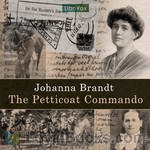 The Petticoat Commando
The Petticoat Commando
In introducing the English version of this book I venture to bespeak a welcome for it, not only for the light which it throws on some little-known incidents of the South African war, but also because of the keen personal interest of the events recorded. It is more than a history. It is a dramatic picture of the hopes and fears, the devotion and bitterness with which some patriotic women in Pretoria watched and, as far as they could, took part in the war which was slowly drawing to its conclusion on the veld outside... | |
By: Maria Edgeworth (1768-1849) | |
|---|---|
 Castle Rackrent
Castle Rackrent
| |
By: Anne Wales Abbott ed. (1808-1908) | |
|---|---|
 Autumn Leaves, Original Pieces in Prose and Verse
Autumn Leaves, Original Pieces in Prose and Verse
The pieces gathered into this volume were, with two exceptions, written for the entertainment of a private circle, without any view to publication. The editor would express her thanks to the writers, who, at her solicitation, have allowed them to be printed. They are published with the hope of aiding a work of charity,—the establishment of an Agency for the benefit of the poor in Cambridge,—to which the proceeds of the sale will be devoted. | |
By: John R. Lynch (1847-1939) | |
|---|---|
 The Facts of Reconstruction
The Facts of Reconstruction
After the American Civil War, John R. Lynch, who had been a slave in Mississippi, began his political career in 1869 by first becoming Justice of the Peace, and then Mississippi State Representative. He was only 26 when he was elected to the US Congress in 1873. There, he continued to be an activist, introducing many bills and arguing on their behalf. Perhaps his greatest effort was in the long debate supporting the Civil Rights Act of 1875 to ban discrimination in public accommodations.In 1884 Lynch was the first African American nominated after a moving speech by Theodore Roosevelt to the position of Temporary Chairman of the Republican National Convention in Chicago, Illinois... | |
By: Jacob Stroyer (1849-1908) | |
|---|---|
 My Life in the South
My Life in the South
My Life in the South is the vivid and touching autobiography of African-American former slave, Jacob Stroyer. It recounts experiences from his early childhood on the planation up to his involvement in the Confederacy's war effort and eventually his experience of becoming a free man. | |
By: Richard Henry Dana, Jr. (1815-1882) | |
|---|---|
 Two Years Before the Mast
Two Years Before the Mast
| |